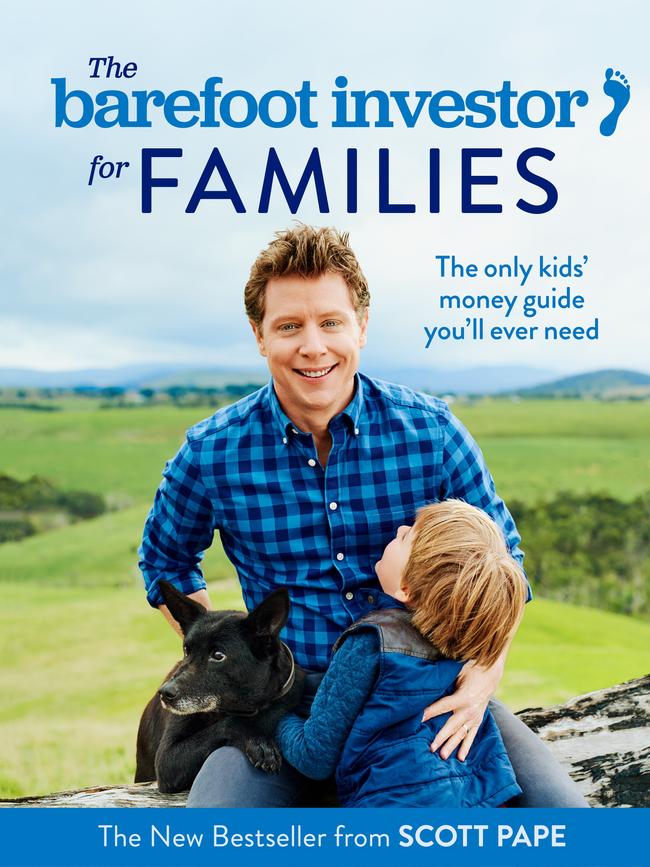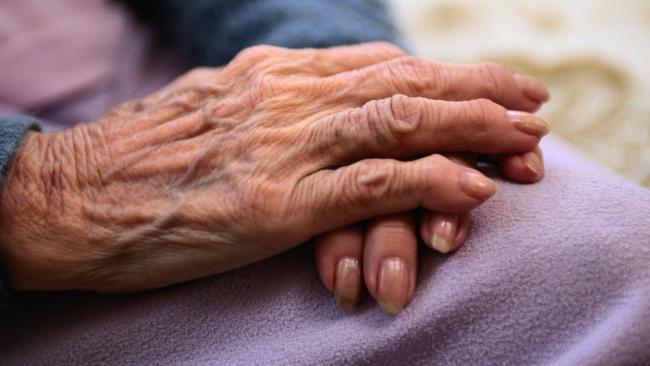Barefoot Investor: The power to change our luck lies within
THE biggest risk retirees face isn’t the short-term wobbles of the share market, it’s running out of money before they die. But when it comes to our financial luck, we all have the power to change things before it’s too late, writes the Barefoot Investor.
Barefoot Investor
Don't miss out on the headlines from Barefoot Investor. Followed categories will be added to My News.
DON’T BLOW YOUR LUCK
NICOLE ASKS: My husband and I are 35. Last year he made quite a lot of money in his hobby of cryptocurrency — $1 million in fact! (Though sadly half of this goes to tax.) Before this we had debt so we’re now happily debt free — and we have both quit our jobs!
I am now a stay-at-home mum and he is trying to start a business. But now I’m worried that we have no incoming super contributions. Also, we do not own a home yet. Should we both be paying ourselves super?
ASIC LAUNCHES REVIEW INTO SCHOOL BANKING
NEW SUPER RULES CONFUSE RETIREES
We need some good advice as I don’t want to mess up this opportunity!
BAREFOOT REPLIES: Congratulations — you won the lotto!
That’s the way I want you to think about your win: it wasn’t skill, it wasn’t hard work, it was simply luck.
You got one million luckies.
And you know what studies show happens to many people who win the lotto?
Eventually, they end up blowing it.
So from now on, act like you’ve used up all your luck in life. The smartest thing you can do is to walk away from the table a winner. (Learn the lesson of Sir Isaac Newton — one of the most influential scientists of all time — who made a tidy sum betting on the South Sea Company “bubble”, but then got greedy and bought back in … only to lose his entire life savings.)
If I were in your shoes, I’d do three things:
First, avoid throwing a heap of money into a small business just because you have the cash.
Most businesses fail. Don’t risk your money.
Instead, I’d encourage your husband to get a job working for someone who owns a business like the one he’s thinking of starting. Think of it as a paid education in running the business. Down the track, when he’s ready, he could go out on his own.
Second, buy a modest family home that you can pay off as quickly as possible.
Third, put your long-term savings on autopilot by boosting your superannuation contributions to 15 per cent of your pre-tax income, and get your husband to make a regular spousal contribution on your behalf while you’re looking after the kids.
Good … luck!

USE YOUR SUPER POWER
SUSAN ASKS: I am a single working woman, 61 years old, planning to retire in five years. I am now wondering if I should be concerned about my superannuation reducing with the recent share market losses. If it is going to crash again, should I be moving to cash rather than shares?
BAREFOOT REPLIES: I totally get how stressful it must be.
The truth is that if a share market crash coincides with the years leading up to or after retirement, it can have a devastating effect on your plans.
Right now, your super contributions are most likely going into a share investment option.
However, I’ve always said that in your last few years of work, you should divert some of those super contributions into a cash or fixed interest option within your super.
How much?
Well, that’s up to you (and your adviser). However, a good rule of thumb is having a minimum of two years’ living expenses (less any age pension you’ll receive).
Now, let me be James Blunt: the biggest risk you face isn’t the short-term wobbles of the share market — it’s running out of money before you die. I see people who find themselves in this situation all the time, and if they’ve given up working, there’s nothing they can do.
Susan, right now you have the power to change things. It’s not too late. So make an appointment with your super fund’s financial planner and work out how much you need to retire on. Get a figure to aim at. And hit it.

BUCKET BUSINESS
DEB ASKS: I love your book and love passing it on to other people.
But what comes back to me from some of my self-employed friends is that they do not have a steady income. What is your recommendation for these people in setting up their buckets?
BAREFOOT REPLIES: My book sets out how I manage my own money: I’m self-employed, and it works!
When small business owners tell me that the buckets strategy doesn’t work for them, it’s nearly always because their business isn’t making enough dough.
And it’s also because they don’t keep their business and personal finances totally separate. It’s all mashed together.
So, the key for small business owners is to “know your numbers” — that is, the absolute minimum you need to earn in your business to keep the doors open and the absolute minimum you need each month to live on personally. Then you set up your personal buckets up accordingly.
But I also have some business buckets:
I transfer 40 per cent of whatever the business earns into a separate business savings account to meet my tax obligations.
(Yes, it can sit there for months … but I’m conservative. I’m simply the bagman for the taxman.)
In addition, I have a business mojo account (for emergencies) and I keep a very close eye on our working capital, so I can always meet my obligations.
If you think this sounds difficult, try running a business without it.

CORE LESSONS
ETHAN ASKS: I read in the news this week that ASIC is finally launching a review of school banking — maybe it has something to do with that book of yours! What is your view on this? Do you think this could get the banks out of our schools, or is it still too early to get our hopes up?
BAREFOOT REPLIES: Here’s what I hope the ASIC review will discuss:
The Commonwealth Bank’s school banking program has, according to their website, “been teaching generations of young Australians the importance of saving and lifelong money skills since 1931”.
So let me ask you this: If what they did worked, why do we currently have record household debt, and low savings?
How did we end up with the horrors of the banking royal commission (where Commbank received a gold medal for charging fees for no service to dead customers and ripping off millions of dollars of retirees’ money)?
And why are school leavers the most financially illiterate of all Aussies, according to ASIC research?
The answer, I believe, is that up till now, many schools haven’t given financial education the emphasis it really deserves — possibly because they wrongly assume that Commbank is taking care of it.
The best outcome from this ASIC review would be that schools finally understand that financial education is a core life skill, far too important to be outsourced to a bank that pays millions of dollars to market to our kids.

I HAVE been feeling a bit low lately.
My grandmother died this week, at the grand old age of 92.
My other grandmother died a few months ago, aged 93.
These two women shaped my life, and this week I’ve spent some time looking back at theirs.
These days it feels like we’re living through a time of rapid change: businesses are being disrupted, robots threaten to take our jobs, and your mother is now on social media (Hi Mum!).
Well, picture this: Your family home doesn’t have a television. Or a refrigerator.
Or a washing machine. Or an electric stove. Or airconditioning. Or a husband, because he’s off fighting a deadly war in a place you’d never heard of.
Your home doesn’t even have the most important appliance: a flushing toilet.
If you wake up and want to do your biz, you have to head out to the backyard with a candle and sit on a pot. A bloke empties it … once a week. (Can you imagine the smell after a week? Sure puts another spin on leaving the toilet seat up, right?)
Well, that was the life my grandmothers lived when they were raising my parents.
Now that is what you call massive change.
Look, things don’t change much year to year: there’s a new $2300 iPhone that allows you to send a Poo Emoji. MySpace changes to Facebook. Cars get more safety features.
It’s only when you stretch out and look at the world over the course of somebody’s lifetime that you get a sense of how astonishing the changes have been.
Let’s face it — you wouldn’t trade lives with even the wealthiest people in the 1920s.
Especially if you were a woman.
My grandmothers were amazing country women who built loving families yet, truthfully, they were never given the opportunity to do anything different.
Today their great-granddaughter — my daughter — has amazing opportunities they never had. And that is one of the most exciting changes of all.
In loving memory of Kath and Lorna. Here’s to all the strong women!
Tread Your Own Path!
Originally published as Barefoot Investor: The power to change our luck lies within


